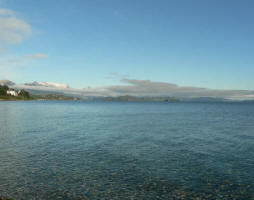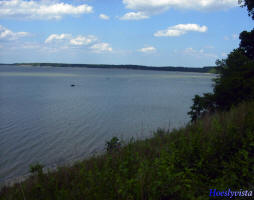 Lebanese Ministry of Energy and Water and US Government signed $27,5 million memoranda of understanding for assistance to water sector
Lebanese Ministry of Energy and Water and US Government signed $27,5 million memoranda of understanding for assistance to water sector
|
On June 15, 2010 the U.S. government and the Lebanese Ministry of Energy and Water signed two memoranda of understanding to provide in-kind assistance and capacity building support for Lebanon’s water sector. With funding made available through the U.S. Agency for International Development (USAID) and in close coordination with the Ministry of Energy and Water, the International Resources Group (IRG) will support the Litani River Authority (LRA) and Development Alternatives Incorporated (DAI) as they develop Lebanon’s four water establishments attain financial and operational sustainability. Under the $8 million Litani River Basin Management Support program, IRG will provide technical assistance and training, implement limited-scale infrastructure activities, and procure specialized equipment for the LRA. The program will assist the Litani River Authority into transform into a river basin agency. Under USAID’s $19.5 million, Lebanon Water and Wastewater Sector Support program, DAI will improve the management, operations and services of Lebanon’s water establishments. The program will introduce new areas of assistance in staff capacity building and capital investment planning; invest in infrastructure and equipment; and work on harmonizing the water establishment’s national strategic water and wastewater master plan. Speaking at the signing event, Ambassador Sison expressed her appreciation for the efforts of the Ministry of Energy and Water to improve the water sector in Lebanon. Ambassador Sison said, “It is our sincere belief that the ongoing cooperation between our two countries in developing water management capacity in Lebanon will result in long-term benefits, not only for the Lebanese citizens of today, but for generations of Lebanese to come.” |
About IRG :
Working with governmental
agencies, communities, end users, and the private sector, International
Resources Group seeks to increase water supply through improvements in
efficiency and equity of water use and satisfy the growing demand of urban and
rural households, industries, and farmers. With extensive integrated water and
land management experience, and guided by a deep understanding of the
ridge-to-reef dynamic, our experts help prepare for and mitigate the negative
effects of floods, droughts, and accidental contaminating spills. Improving the
supply of clean water, sanitation practices, and health of the population while
safeguarding the environment and planning for climate change adaptation and
mitigation are key considerations in our approach to integrated water resource
management
Capabilities:
- River Basin Planning
- Watershed Management
- Water Quality Assessment/Enhancement
- Water Policy Reform
- Water Management and Wastewater Reuse
- Coastal Resources Management
- Coastal Zone Development
Select projects include:
Providing Integrated Water and Coastal Resource Management
IRG provides technical assistance, capacity building, planning and
analytical services for water and coastal management projects in countries
around the world, including developing, expanding and rehabilitating safe water
supply and sanitation services for cities and rural areas, creating sustainable
fisheries and aquaculture, protecting coral reefs, controlling pollution,
managing irrigation and wastewater systems, and mitigating and adapting to
climate change. Our work includes various crosscutting activities, including
capacity building and institutional strengthening, assessment and analysis,
policy and legal program support, and data and information collection and
sharing. IRG leads a consortium of universities, NGOs, small businesses, other
consulting firms, and resource organizations dedicated to meeting the needs of
USAID and host-country clients. Worldwide:
Integrated Water and Coastal Resources Management IQC
Improving Resource Efficiency through Decentralization and Better
Agricultural Practice
In close partnership with the Egyptian
Ministry of Water Resources and Irrigation, IRG has worked with USAID for more
than a decade to develop and implement appropriate responses to Egypt’s water
scarcity. IRG supports efficient water use in agriculture by shifting to
high-value, low water-consuming crops, introducing on-farm water-saving
technologies, and developing institutional capacity and systems for
decentralized and integrated management of water resources. To date, 27
integrated water management districts (IWMD) and 600 Branch Canal Water Users’
Associations (BCWUA) have been established covering 1.2 million feddans (one
feddan = 1.038 acres). By project completion in 2012, an additional 45 water
management districts will be established in the East Delta area to manage water
for 2.2 million feddans of agricultural land, about 27% of Egypt’s cultivated
area. Working together, the IWMDs and BCWUAs serve to allocate water resources
efficiently, distribute them equitably, and strengthen local water management
capacities. Egypt:
Integrated Water Resources Management I-II
Promoting Effective Water Resources Management to Protect the
Environment
IRG recently completed implementing the Integrated
Watershed Resources Management project in Honduras to improve the management of
critical watersheds and support economic growth through sustainable management
of natural resources. IRG developed 27 community sub-watershed management plans
that included risk and vulnerability assessments and action plans. The
subwatershed action plans under implementation include water source protection,
forestry and agroforestry actions, and improving water quality. Eighteen
environmental policies in support of Honduras’ CAFTA environmental obligations
were implemented in collaboration with the Honduran government and the private
sector. IRG implemented cleaner use and production of water through water
balances and water quality monitoring programs that formed part of the watershed
action plans. Honduras:
Integrated Watershed Resources Management
Implementing a Regional Benchmarking System for Water
Management
Population and income growth, and accompanying increases
in demand for water are placing growing pressure on the limited water resources
of the Middle East and North Africa (MENA). In this context, the IRG team is
designing and implementing a regional water governance benchmarking system – a
strategic framework and a set of yardsticks to evaluate national water
management institutions, mechanisms and processes, and to assist in defining
objectives and targets for better water management and policy making. IRG’s
approach assists MENA water policy makers and donors develop and employ a
strategic framework to assess legal, institutional, and policy structures for
water management; integrate social, economic, and environmental considerations
into national water master plans; establish and build capacity to define and
monitor benchmarks; identify standards to evaluate water services delivery; and
provide a water management vision that stresses efficiency, participation,
equity, and sustainability. Blue
Revolution Initiative: Regional Water Governance Benchmarking in the MENA
region
Improving Health and Promoting Efficiency through Wastewater
Treatment and Reuse
In conjunction with the Water Authority of
Jordan and local authorities, IRG and its team carried out feasibility studies
to select sites for pilot activities and determine appropriate treatment and
reuse technologies, carried out environmental impact assessments, prepared
documents for competitive tenders, and assisted with evaluation of bids. Our
team is now supervising the construction of facilities, and engaging with local
and central government authorities on arrangements for operations and
maintenance, including the development of institutional arrangements and cost
recovery mechanisms. When completed, we will provide training in operations and
prepare manuals for that purpose. In the initial stages of operations, we will
monitor the quality of treated effluents. Jordan:
Wastewater Treatment/Reuse Activity
Conserving Biodiversity in Watersheds
This project
strategically focuses resources on mitigating key threats facing the Panama
Canal Watershed and improving its ability to maintain the hydrological
functioning of the system, protect biodiversity, and enhance rural economic
development. IRG and its partner support improved watershed management and
biodiversity conservation by: assisting communities and government agencies in
developing and implementing action plans for sub-watershed management; providing
small grants and technical assistance to small businesses for resource
management, biodiversity conservation, and community-based new enterprise
development and strengthening; providing training and technical assistance to
incorporate good management practices, developing business plans, and and
linking small businesses to buyers and markets to support the creation of new
enterprises; and strengthening the policy and institutional enabling conditions
to improve environmental management in the watershed. Panama:
Management of Critical Watersheds
Defining Water Policy and Regulatory Frameworks
To
improve water management in Honduras, IRG designed and organized stakeholder
meetings; identified and met with key constituents in the institutional and
policy environments; identified and provided copies of technical reports
relevant to the design effort; prepared a synthesis of USAID and Honduran
experiences in natural resource and water resource policy; compiled a list of
interventions with the most potential to achieve sustainable watershed results;
and incorporated its findings into a brief which included commendations in water
policy and the institutional and regulatory framework. Honduras:
Effective and Sustainable Water Management
----
Wastewater Systems for Small Villages (MS Word, 123kb)
In cooperation with municipalities in the Bekaa, the program builds small wastewater treatment systems to protect the upper Litani River Basin and the health of local communities. It provides a comprehensive solution to mitigate water quality degradation of the Litani River from uncontrolled discharge of untreated domestic wastewater in the upper Litani River basin.
Litani River Basin Management Support (MS Word, 84kb)
The program supports improved, more efficient and sustainable water resource management in the Litani River Basin by providing technical support to the Litani River Authority, procuring specialized equipment, and implementing limited scale infrastructure activities.
Lebanon Water and Wastewater Sector Support (MS Word, 85kb)
In cooperation with the Ministry of Energy and Water, the program assists all four of Lebanon’s Water Establishments attain financial and operational sustainability and overcome the many challenges they face.
| Contact information | n/a |
|---|---|
| News type | Inbrief |
| File link |
http://www.usaid.gov/lb/articles/press_release_1200.html |
| Source of information | USAID / Projects Middle East |
| Keyword(s) | River Basin Planning, Watershed Management, Water Quality Assessment, Water Policy Reform, wastewater reuse, coastal resources management, coastal zone development |
| Subject(s) | AGRICULTURE , ANALYSIS AND TESTS , CHARACTERISTICAL PARAMETERS OF WATERS AND SLUDGES , DRINKING WATER , DRINKING WATER AND SANITATION : COMMON PROCESSES OF PURIFICATION AND TREATMENT , ENERGY , FINANCE-ECONOMY , HYDRAULICS - HYDROLOGY , INFRASTRUCTURES , METHTODOLOGY - STATISTICS - DECISION AID , NATURAL MEDIUM , POLICY-WATER POLICY AND WATER MANAGEMENT , PREVENTION AND NUISANCES POLLUTION , RISKS AND CLIMATOLOGY , SANITATION -STRICT PURIFICATION PROCESSES , WATER DEMAND , WATER QUALITY |
| Relation | http://www.semide.org/countries/fol749974/country958156 |
| Geographical coverage | Lebanon, |
| News date | 26/08/2010 |
| Working language(s) | ENGLISH |
 you are not logged in
you are not logged in





